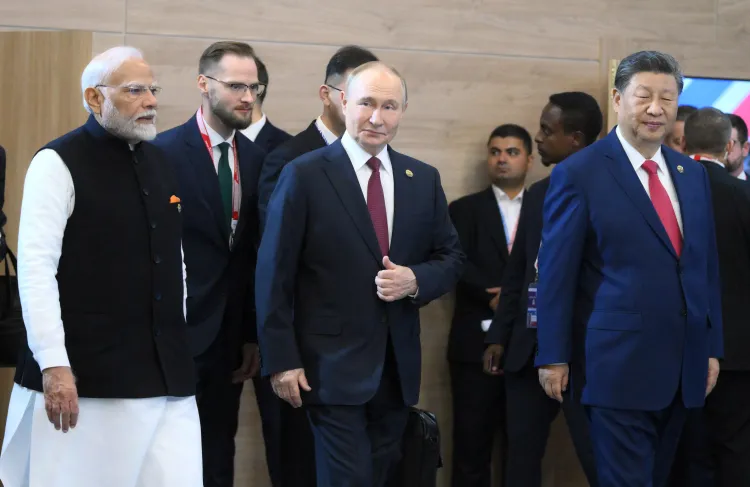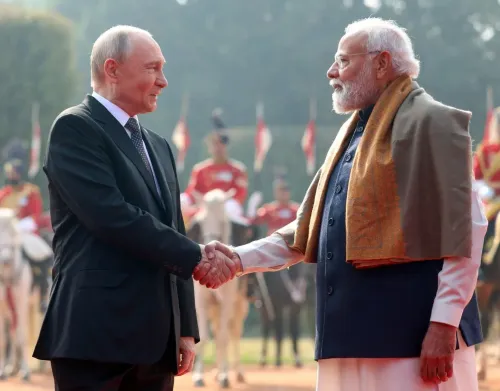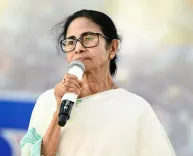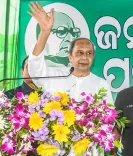Can Stable India-China Relations Foster Regional and Global Peace?

Synopsis
Key Takeaways
- Stable India-China relations are vital for regional peace.
- Mutual respect and interests are key to advancing ties.
- PM Modi's visit aims to strengthen economic cooperation.
- Ongoing dialogues highlight commitment to resolving border issues.
- The SCO Summit will provide a platform for further collaboration.
Tokyo, Aug 29 (NationPress) Prime Minister Narendra Modi emphasized the importance of stable, predictable, and amicable relations between India and China, stating that such ties are crucial for a multi-polar Asia and a multi-polar world. He believes that positive interactions between these two neighboring nations can significantly influence regional and global peace and prosperity.
In a discussion with Japan's prominent daily, The Yomiuri Shimbun, PM Modi highlighted India's commitment to enhancing ties with China through mutual respect, shared interests, and sensitivity to each other's concerns. He mentioned that since his previous meeting with Chinese President Xi Jinping in Kazan last year, the progress in India-China relations has been steady and encouraging.
When asked about the significance of improving relations with China at this juncture, PM Modi replied, "At the invitation of President Xi Jinping, I will be traveling to Tianjin to participate in the SCO Summit. Our bilateral ties have made consistent and positive advancements since my last meeting with President Xi. Maintaining stable, predictable, and friendly relations between India and China—as the two largest nations on the planet—can greatly benefit regional and global peace and prosperity. This is essential for fostering a multi-polar Asia and world."
He further commented to The Yomiuri Shimbun: "In light of the current volatility in the world economy, it is vital for India and China, as significant economies, to collaborate in stabilizing the global economic landscape. India is eager to enhance our bilateral relations from a strategic and long-term viewpoint, founded on mutual respect, interests, and sensitivity, while improving strategic communication to tackle our development challenges."
These remarks precede PM Modi's visit to China for the Shanghai Cooperation Organisation (SCO) Summit in Tianjin, scheduled for August 31 to September 1. In his departure statement, PM Modi expressed anticipation for discussions with President Xi Jinping, Russian President Vladimir Putin, and other leaders during the summit.
"From Japan, I will head to China for the SCO Summit in Tianjin, at President Xi Jinping's invitation. India actively contributes to the SCO, having introduced new initiatives and fostered collaboration in innovation, health, and cultural exchanges. We remain committed to working alongside SCO members to tackle common challenges and strengthen regional cooperation, and I look forward to engaging with President Xi, President Putin, and other leaders at the summit," PM Modi stated on Thursday.
This visit marks PM Modi's first trip to China since 2018, and notably since the violent clash in Galwan Valley in June 2020 between troops from both nations at the Line of Actual Control (LAC).
During the BRICS Summit in Russia's Kazan in 2024, PM Modi and Xi Jinping held a meeting that provided a breakthrough in bilateral discussions, following an agreement on patrols along the approximately 3500-km LAC to conclude a four-year border standoff.
On August 21, China's Ambassador to India, Xu Feihong, expressed that PM Modi's upcoming visit to Tianjin for the SCO Summit would invigorate the relationship between both countries.
"PM Modi's visit to China will be a significant event, not just for the SCO but for the bilateral ties between both nations. A collaborative effort is underway from China and India to ensure the success of this visit, which we regard as highly important," Xu Feihong remarked.
On August 19, Chinese Foreign Minister Wang Yi met PM Modi in New Delhi, delivering a message and invitation from President Xi Jinping for the SCO Summit.
"It was a pleasure to meet Foreign Minister Wang Yi. Since my meeting with President Xi in Kazan last year, our relations have made commendable strides, guided by mutual respect for interests and sensitivities. I am looking forward to our forthcoming meeting in Tianjin during the SCO Summit. Stable, predictable, and constructive ties between India and China will considerably contribute to both regional and global peace and prosperity," PM Modi tweeted after their meeting.
During this meeting, PM Modi underscored the need for maintaining peace along the border and reiterated India's commitment to a fair and mutually acceptable resolution of boundary issues.
"The Prime Minister welcomed the steady and positive developments in bilateral relations since his last meeting with President Xi, highlighting mutual respect, interests, and sensitivity, including the revival of the Kailash Manasarovar Yatra," stated a release from the Prime Minister's Office (PMO).
"The Prime Minister thanked President Xi for the SCO Summit invitation and confirmed his attendance. He expressed support for China's leadership role at the summit and looked forward to their meeting in Tianjin. The PM stressed that stable, predictable, and constructive relations between India and China are crucial for both regional and global peace and prosperity," it added.
The SCO is a permanent intergovernmental international organization founded in Shanghai on June 15, 2001. The member states include China, Russia, India, Kazakhstan, Kyrgyzstan, Tajikistan, Pakistan, Uzbekistan, Iran, and Belarus. The SCO also has two observer nations—Afghanistan and Mongolia—and 14 dialogue partners, including Turkey, Kuwait, Azerbaijan, Armenia, Cambodia, Nepal, Sri Lanka, Saudi Arabia, Egypt, Qatar, Bahrain, the Maldives, Myanmar, and the United Arab Emirates.









